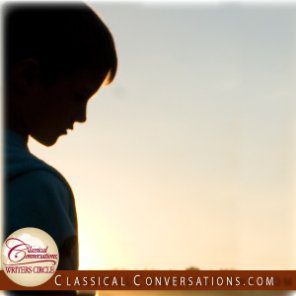Socks worn wrong side out, tags cut from every piece of clothing, food which mustn’t touch and must be of similar consistency and color. Odd questions at odd times on odd topics, usually in public from a tiptoeing, finger-waving, beautiful enigma. No eye contact. No hugs. This is an easy day with a child with autism. Then there are the difficult days. Then the little darling starts school.
As the overall number of homeschooled students increases, the number of parents choosing home education for their children with autism similarly continues to rise.1 2 As the mother of a son with autism and as a classical home educator of over sixteen years, I am convinced that a classical, Christian education at home, by the grace of God, is the best way to fit these intense, amazing children for kingdom work on Earth and to prepare their souls for Heaven.
Last summer, I was privileged to speak at several Classical Conversations 3-Day Parent Practicum events. During these events I answered many forms of the question, “My autistic child has done better than I thought he would in Foundations and, with help, he’s even done alright in Essentials; can he make it in Challenge?” I looked these parents in the eyes and said, “Yes.” I did not know the children in question, the home situation, or the parent’s level of familiarity with classical methods. How could I be so confident?
I do know these three things:
Parents are their children’s best teachers. We study our children, pray for them, and are the experts on their quirks and eccentricities. Who better to instruct, discipline, and inspire these exceptional people made in God’s image for the purpose of doing the work of God’s kingdom? Autistic children are gifts to us and to the world. We must cultivate them as such.
Parents are not alone. God knows exactly what He is doing when He entrusts us with each of our children. One of the greatest resources He has provided is community. For support in teaching our older, autistic children, we have a rapidly expanding network of Challenge classes across the country where students gain facility with the tools of learning they are practicing at home. A Challenge classroom is a safe environment with a low-variance routine, a small cohort of classmates and the opportunity for a scaled workload. This preserves the integrity of the classical method while providing the student with individualized education one-on-one at home which will enable him to pursue what is true, good, and beautiful, rather than the merely pragmatic. Autistic children need community, and Classical Conversations communities are richer for having our children in them.
Classical, Christian home education is uniquely suited to the autistic child. We must make much of the goals of a classical, Christian education for the child with autism and acquaint ourselves with the tenets of classical education. The Classical Conversations Bookstore has a fine selection of books on this topic for parents. Remember that as classical educators we are striving with our students toward appreciation of beauty, articulation of truth, and love of what is good for the purpose of attaining virtue. These are skills which may be practiced in many content areas. For the Challenge student with autism this will mean modifying the way certain assignments are completed. It will affect the timetable for some, stretching a thirty-week Challenge year to thirty-six or forty (or more). It will come as no surprise, I am sure, that this discussion has moved beyond Challenge, or even homeschooling. We are talking now about discipline for life. In a Challenge community a student will find the iron to sharpen him, the mirror to reflect his image, and the practice arena in which he may safely wield and parry with the rhetorical weapons he will use to persuade those in his world toward ultimate Truth. Challenge may just be the best place for an older student with autism.
_____________________________________________________________
1 Duffey, PhD, Jane G., (2002) Home Schooling Children With Special Needs, A Descriptive Study. National Home Education Research Institute, Volume 15 (No.2) p. 1-13
2 Hurlbutt, Karen S., (2011) Experiences of Parents Who Homeschool Their Children With Autism Spectrum Disorders. Focus on Autism and Other Developmental Disabilities, Volume 26 (No. 4) p. 239-249




